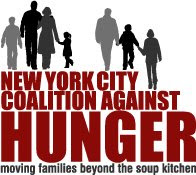
Immigrants are disproportionately vulnerable to economic insecurity and remain disproportionately underserved by the food stamps program, according to a study entitled
“Nourishing NYC: Increasing Food Stamps Access to Immigrant Communities,” released by the
Urban Justice Center last week. According to the study, eligible non-citizens are only 77% as likely as citizens to receive food stamp benefits, with citizen children of non-citizens remaining particularly underserved.
Current law allows immigrants who have legally resided in the United States for at least five years to participate in the food stamps program. All legal immigrants under the age of 18 or receiving disability benefits, regardless of their length or residence are also eligible. The Department of Justice states that legal immigrants cannot face deportation or “public charge” designation (which can negatively affect immigration status) as a result of applying for nutrition benefits. Additionally, illegal immigrants are granted certain protections from immigration status disclosure when applying for benefits for their resident children.
A complicated history of immigration requirements on both the City and national level has contributed to widespread misperceptions about eligibility requirements which, when compounded with language barriers and a lack of targeted outreach to immigrant communities, has led to lagging participation rates for immigrants and their citizen children.
The Urban Justice Center called on the federal government to extend food stamp benefits to all lawful immigrants, regardless of their length of residency. City and state authorities were urged to increase language access through community pre-screening programs, modeled after the Food Card Access Project and the FoodChange outreach program, which have effectively increased immigrant food stamp enrollment. Further city and state recommendations included providing service notices in the seven languages in which applications are currently available: English, Arabic, Chinese, Haitian Creole, Korean, Russian and Spanish. For the over 83,000 non-citizens in New York City who are eligible for food stamps but do not receive them, these policy recommendations are a step towards granting them the federal nutrition assistance to which they are entitled.
 Immigrants are disproportionately vulnerable to economic insecurity and remain disproportionately underserved by the food stamps program, according to a study entitled “Nourishing NYC: Increasing Food Stamps Access to Immigrant Communities,” released by the Urban Justice Center last week. According to the study, eligible non-citizens are only 77% as likely as citizens to receive food stamp benefits, with citizen children of non-citizens remaining particularly underserved.
Immigrants are disproportionately vulnerable to economic insecurity and remain disproportionately underserved by the food stamps program, according to a study entitled “Nourishing NYC: Increasing Food Stamps Access to Immigrant Communities,” released by the Urban Justice Center last week. According to the study, eligible non-citizens are only 77% as likely as citizens to receive food stamp benefits, with citizen children of non-citizens remaining particularly underserved.  Immigrants are disproportionately vulnerable to economic insecurity and remain disproportionately underserved by the food stamps program, according to a study entitled “Nourishing NYC: Increasing Food Stamps Access to Immigrant Communities,” released by the Urban Justice Center last week. According to the study, eligible non-citizens are only 77% as likely as citizens to receive food stamp benefits, with citizen children of non-citizens remaining particularly underserved.
Immigrants are disproportionately vulnerable to economic insecurity and remain disproportionately underserved by the food stamps program, according to a study entitled “Nourishing NYC: Increasing Food Stamps Access to Immigrant Communities,” released by the Urban Justice Center last week. According to the study, eligible non-citizens are only 77% as likely as citizens to receive food stamp benefits, with citizen children of non-citizens remaining particularly underserved. 
No comments:
Post a Comment